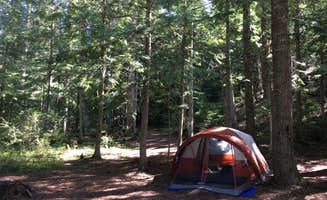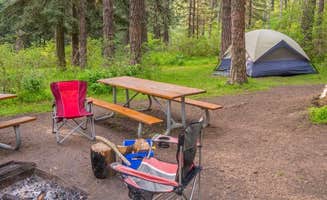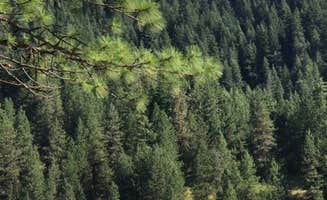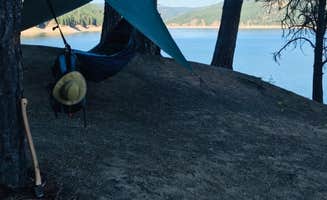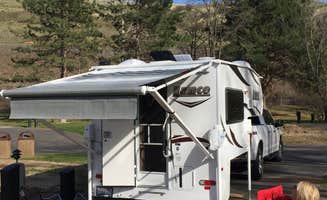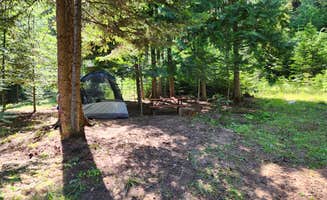Tent camping opportunities around Harvard, Idaho extend beyond the immediate vicinity, with several sites located within a reasonable driving distance. The region sits at elevations ranging from 2,700 to over 4,000 feet, creating varied camping conditions throughout the seasons. Most sites remain accessible from late spring through early fall, with forest roads typically clear of snow by mid-May.
What to do
Fishing opportunities: Lake Elsie Campground offers productive fishing for brook and rainbow trout. "We always catch lots of brooke and rainbow trout and wild life is everywhere! There is a outhouse bathroom but you are on you're own otherwise!" notes Jessica C.
Hiking trails: The Big Eddy Marina & Lodge area provides access to scenic backpacking trails. "This is a backpacking trail. The first half mile is difficult but then the trail levels out and is easy for many miles. There's free dispersed camping sites starting after 4.5 miles down the trail," reports Megan K.
Cave exploration: Near Marble Creek Campground, visitors can explore a unique geological feature. "Just miles from the camp, there is an old man-built cave that makes its way through the entire mountain. You can drop family members off, let them walk through the exciting damp, dark cave, and pick them up on the other side," shares Jade F.
What campers like
Secluded lakeside sites: Many campers prefer the remote setting of alpine lakes. "What a place! I saw no trash or broken glass, it was very clean. Sites only had a fire pit, I believe there are also pit toilets but I didn't have time to check them out," reports Samuel H. about Lake Elsie.
Walk-in tent sites: Mini Camp 5.0 offers privacy for those willing to hike in. "Views are spectacular. Little wind coverage during the day though it's very private with quite a distance off the Big Eddy trail to get down to the waterside spot. Vaulted toilet, fire ring and a picnic table make for some comfy accommodations," notes Rachel A.
Wildlife viewing: Tent campers at Harvard-area sites often report animal sightings. "Wild life is everywhere!" mentions Jessica C., while others note the importance of proper food storage as bears frequent some campgrounds, particularly at higher elevations.
What you should know
Road conditions: Access to remote sites can be challenging. For Lake Elsie: "The road up is rough, potholes, it does get better about halfway up. Expect at least 30 minutes to get up after you hit the gravel, and that's pushing it pretty hard," warns Samuel H.
Noise considerations: Highway proximity affects some sites. At Giant White Pine Campground, "Right off the highway, so traffic noise consistently. The trails are nice, but you don't come across water very often. Better for bikes and atv's," explains Tanny M.
Pack necessities: Most sites require campers to bring their own water and toilet paper. "The USFS website is wrong about the fees, it's now $12 to camp with $2 for additional vehicles. There isn't much extra parking though, so you may end up parking on the road outside of the campground. Also, bring your own TP as there wasn't any when I was there," advises Leslie H.
Tips for camping with families
Wildlife awareness: Teach children proper food storage techniques. At Lake Elsie, "multiple bears went through the campground in the evening and came back at around 3am. Be careful with your food and be smart," cautions Natalie J.
Accessible sites: Some locations accommodate mobility needs. "Sometimes it's hard to find sites where you can have a person in a wheelchair move around okay. These sites are good for that according to my cousin who has camped with out family in this area," reports Megan K. about Partridge Creek Campground.
Swimming options: Identify safe water access points for children. At Mini Camp 4.8, Rachel A. notes it has "a nice long ramp to the water and plenty of space this site is ideal for a larger group," making water access easier for families.
Tips from RVers
Site selection for noise: RV campers should consider road noise when choosing sites. Giant White Pine might be "OK in a RV" despite road noise that makes it "awfully noisy for tent camping" according to Gretchen B.
Size limitations: Most camping areas near Harvard aren't suitable for larger rigs. At Kamiak Butte County Park, "We stayed in site #4 which was right at the end with glimpses of the Palouse through the trees and lots of space. You could easily set up 2 tents there. It was $15 a night plus $5 for an extra car," notes Kelsey G., indicating the site size limitations.
Off-season advantages: RVers can find greater solitude during shoulder seasons. "We checked out campground and the giant white pine but decided not to camp there due to its proximity to a busy road. Lots of logging trucks made it awfully noisy for tent camping," reports Gretchen B., suggesting off-season visits might offer quieter conditions.


